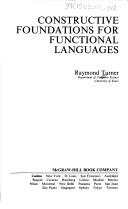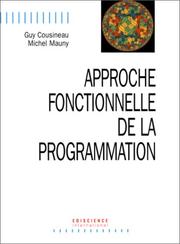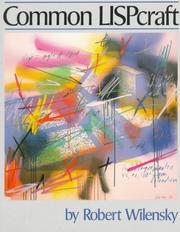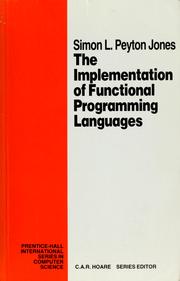| Listing 1 - 10 of 73 | << page >> |
Sort by
|
Book
ISBN: 0137219520 9780137219520 Year: 1992 Publisher: New York, NY : Prentice-Hall,
Abstract | Keywords | Export | Availability | Bookmark
 Loading...
Loading...Choose an application
- Reference Manager
- EndNote
- RefWorks (Direct export to RefWorks)
Book
ISBN: 0511526571 Year: 1992 Publisher: Cambridge : Cambridge University Press,
Abstract | Keywords | Export | Availability | Bookmark
 Loading...
Loading...Choose an application
- Reference Manager
- EndNote
- RefWorks (Direct export to RefWorks)
The authors describe here a framework in which the type notation of functional languages is extended to include a notation for binding times (that is run-time and compile-time) that distinguishes between them. Consequently the ability to specify code and verify program correctness can be improved. Two developments are needed, the first of which introduces the binding time distinction into the lambda calculus, in a manner analogous with the introduction of types into the untyped lambda calculus. Methods are also presented for introducing combinators for run-time. The second concerns the interpretation of the resulting language, which is known as the mixed lambda-calculus and combinatory logic. The notion of 'parametrized semantics' is used to describe code generation and abstract interpretation. The code generation is for a simple abstract machine designed for the purpose; it is close to the categorical abstract machine. The abstract interpretation focuses on a strictness analysis that generalises Wadler's analysis for lists.

ISBN: 0077074114 9780077074111 Year: 1991 Publisher: New York, NY : McGraw-Hill,
Abstract | Keywords | Export | Availability | Bookmark
 Loading...
Loading...Choose an application
- Reference Manager
- EndNote
- RefWorks (Direct export to RefWorks)

ISBN: 2840741148 9782840741145 Year: 1995 Publisher: Paris: Ediscience international,
Abstract | Keywords | Export | Availability | Bookmark
 Loading...
Loading...Choose an application
- Reference Manager
- EndNote
- RefWorks (Direct export to RefWorks)
Book
ISBN: 0511526563 Year: 1996 Publisher: Cambridge : Cambridge University Press,
Abstract | Keywords | Export | Availability | Bookmark
 Loading...
Loading...Choose an application
- Reference Manager
- EndNote
- RefWorks (Direct export to RefWorks)
Axiomatic categorical domain theory is crucial for understanding the meaning of programs and reasoning about them. This book is the first systematic account of the subject and studies mathematical structures suitable for modelling functional programming languages in an axiomatic (i.e. abstract) setting. In particular, the author develops theories of partiality and recursive types and applies them to the study of the metalanguage FPC; for example, enriched categorical models of the FPC are defined. Furthermore, FPC is considered as a programming language with a call-by-value operational semantics and a denotational semantics defined on top of a categorical model. To conclude, for an axiomatisation of absolute non-trivial domain-theoretic models of FPC, operational and denotational semantics are related by means of computational soundness and adequacy results. To make the book reasonably self-contained, the author includes an introduction to enriched category theory.
Book
ISBN: 0521345898 9780521345897 Year: 1988 Volume: 4 Publisher: Cambridge : Cambridge University Press,
Abstract | Keywords | Export | Availability | Bookmark
 Loading...
Loading...Choose an application
- Reference Manager
- EndNote
- RefWorks (Direct export to RefWorks)
Lambda calculus --- Combinatory logic --- Functional programming languages --- Lambda calculus. --- Combinatory logic. --- Functional programming languages. --- Calculus, Lambda --- Logic, Symbolic and mathematical --- Programming languages (Electronic computers) --- Logic, Combinatory --- Nonclassical mathematical logic --- Logique mathématique --- Logique générale --- Logique combinatoire --- Lambda-calculus
Book
ISBN: 1484272056 1484272048 Year: 2022 Publisher: [Place of publication not identified] : Apress,
Abstract | Keywords | Export | Availability | Bookmark
 Loading...
Loading...Choose an application
- Reference Manager
- EndNote
- RefWorks (Direct export to RefWorks)
Why just get by in F# when you can program in style. This book goes beyond syntax and into design. It provides F# developers with best practices, guidance, and advice to write beautiful, maintainable, and correct code. This second edition, fully updated for .NET 6 and F# 6, includes all new coverage of anonymous records, the task {} computation expression, and the relationship between types and modules. Stylish F# 6 covers every design decision that a developer makes in constructing F# programs, helping you make the most educated and valuable design choices at every stage of code development. You will learn about the design of types and function signatures, the benefits of immutability, and the uses of partial function application. You will understand best practices for writing APIs to be used by F#, C#, and other languages. Each carefully vetted design choice is supported with compelling examples, illustrations, and rationales. What You Will Learn Know why, when, and how to code in immutable style Use collection functions, piping, and function composition to build working software quickly Be aware of the techniques available to bring error handling into the mainstream of program logic Optimize F# code for maximum performance Identify and implement opportunities to use function injection to improve program design Appreciate the methods available to handle unknown data values Understand asynchronous and parallel programming in F#, and how it differs from C# asynchronous programming Exploit records and anonymous records as low-overhead, easily comparable containers for structured data Who This Book Is For Any developer who writes F# code and wants to write it better.
Functional programming languages. --- Programming languages (Electronic computers) --- F♯ (Computer program language) --- Microsoft .NET Framework. --- F-Sharp (Computer program language) --- Functional programming languages --- Object-oriented programming languages --- Dot Net (Software framework) --- Microsoft .NET --- Microsoft .NET software framework --- .NET Framework

ISBN: 0393955443 Year: 1986 Publisher: London : W. W. Norton,
Abstract | Keywords | Export | Availability | Bookmark
 Loading...
Loading...Choose an application
- Reference Manager
- EndNote
- RefWorks (Direct export to RefWorks)
Book
ISBN: 1108266037 1108271499 1108241867 1108416756 Year: 2018 Publisher: Cambridge : Cambridge University Press,
Abstract | Keywords | Export | Availability | Bookmark
 Loading...
Loading...Choose an application
- Reference Manager
- EndNote
- RefWorks (Direct export to RefWorks)
This book explores the fundamentals of computer music and functional programming through the Haskell programming language. Functional programming is typically considered difficult to learn. This introduction in the context of creating music will allow students and professionals with a musical inclination to leverage their experience to help understand concepts that might be intimidating in more traditional computer science settings. Conversely, the book opens the door for programmers to interact with music by using a medium that is familiar to them. Readers will learn how to use the Euterpea library for Haskell (http://www.euterpea.com) to represent and create their own music with code, without the need for other music software. The book explores common paradigms used in algorithmic music composition, such as stochastic generation, musical grammars, self-similarity, and real-time interactive systems. Other topics covered include the basics of signal-based systems in Haskell, sound synthesis, and virtual instrument design.

ISBN: 013453333X 0134533259 9780134533339 9780134533254 Year: 1987 Publisher: Englewood Cliffs, NJ : Prentice-Hall International,
Abstract | Keywords | Export | Availability | Bookmark
 Loading...
Loading...Choose an application
- Reference Manager
- EndNote
- RefWorks (Direct export to RefWorks)
Programming --- Functional programming languages --- 681.3*D34 --- Processors: code generation; compilers; interpreters; optimization; parsing; preprocessors; run-time environments; translator writing systems and compilergenerators (Programming languages) --- Functional programming languages. --- 681.3*D34 Processors: code generation; compilers; interpreters; optimization; parsing; preprocessors; run-time environments; translator writing systems and compilergenerators (Programming languages) --- Programming languages (Electronic computers) --- Electronic digital computers programming --- Computer programming.
| Listing 1 - 10 of 73 | << page >> |
Sort by
|

 Search
Search Feedback
Feedback About
About Help
Help News
News